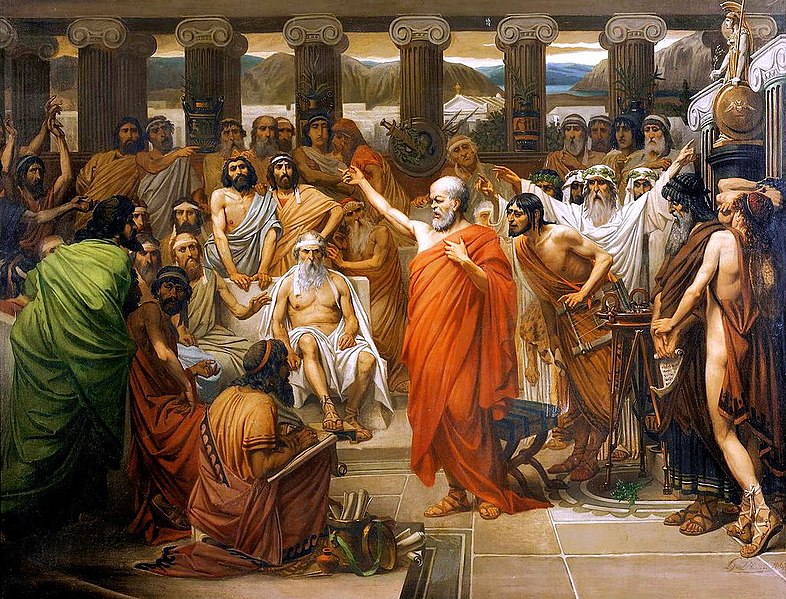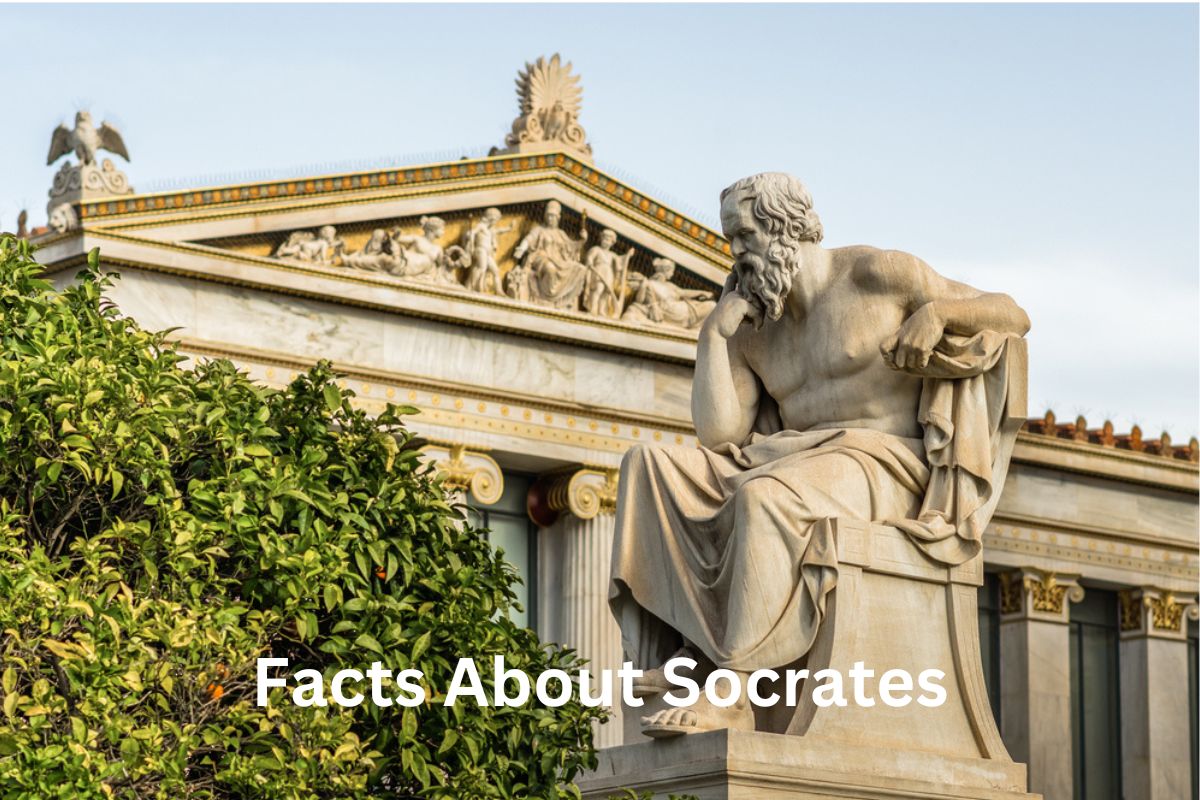Socrates was an ancient Greek philosopher who lived in Athens during the 5th century BCE. Born around 469 BCE, he became one of the most influential figures in Western philosophy, despite not writing any texts himself.
Most of what we know about Socrates comes from the writings of his student Plato. Socrates is renowned for his Socratic method of questioning and dialogue, which aimed to stimulate critical thinking and self-examination.
He believed in the pursuit of wisdom and the examination of one’s beliefs as essential for leading a virtuous life. Socrates challenged established norms and clashed with Athenian society, ultimately facing charges of corrupting the youth and impiety.
In 399 BCE, he was sentenced to death and died by drinking hemlock. His teachings and legacy have left a lasting impact on philosophy, education, and the importance of critical thinking and self-reflection.
Socrates Facts
1. Socrates was an ancient Greek philosopher who lived in Athens during the 5th century BCE
Socrates was an ancient Greek philosopher who lived in Athens during the 5th century BCE. He was born in the city of Athens, although the exact date of his birth is not known with certainty. He spent most of his life in Athens, which was a vibrant center of culture and intellectual activity during that time.

2. He is considered one of the founders of Western philosophy
Socrates is considered one of the founders of Western philosophy and is known for his Socratic method of questioning and dialogue.
The Socratic method involves engaging in a series of questions and answers to stimulate critical thinking and to arrive at deeper insights.
Also Read: Socrates Accomplishments
Socrates used this method to challenge people’s beliefs and assumptions, aiming to lead them to a better understanding of themselves and the world around them.
3. Socrates was born around 469 BCE and died in 399 BCE
Socrates was born around 469 BCE and died in 399 BCE. The precise details of his life are not well-documented since he did not leave behind any written works himself. Most of what we know about Socrates comes from the writings of his students, particularly Plato.
Also Read: Timeline of Socrates
Plato, who was deeply influenced by Socrates, incorporated his teacher’s ideas and character into many of his dialogues, such as “Apology,” “Phaedo,” and “Symposium.”
Other ancient sources, such as Xenophon and Aristophanes, also provide some information about Socrates, albeit with different perspectives. The details of Socrates’ life and teachings are often debated among scholars, and some aspects may be speculative or subject to interpretation.
4. He did not write any books or texts himself
Socrates did not write any books or texts himself. Most of what we know about him comes from the writings of his students, especially Plato. Socrates had a profound impact on his students, who were inspired by his teachings and sought to preserve and share his ideas.
Plato, in particular, became Socrates’ most famous disciple and wrote extensively about his teacher, using him as a central figure in many of his philosophical dialogues. Through these dialogues, Plato presented Socrates’ thoughts, arguments, and philosophical inquiries to the world.

5. Socrates was known for his humility and his claim to know nothing
Socrates was known for his humility and his claim to know nothing. Despite being regarded as one of the wisest men in Athens, Socrates believed that true wisdom comes from recognizing the limits of one’s knowledge.
He famously declared, “I know that I am intelligent because I know that I know nothing.” This statement reflects his emphasis on intellectual humility and the importance of questioning and seeking knowledge.
6. He believed that the pursuit of wisdom and the examination of one’s beliefs and values were essential for leading a virtuous life
Socrates believed that the pursuit of wisdom and the examination of one’s beliefs and values were essential for leading a virtuous life. He sought to encourage people to critically reflect on their own lives and thought processes.
Socrates believed that true knowledge was not about memorizing facts or accepting dogma but rather engaging in a continuous process of questioning, seeking understanding, and examining one’s own assumptions and beliefs.
7. Socrates had a reputation for challenging established norms and authority figures
Socrates had a reputation for challenging established norms and authority figures. He was known to engage in conversations with Athenians from all walks of life, questioning their beliefs and exposing contradictions or inconsistencies in their thinking.
His approach often led him to clash with the political and social elite of Athens, including politicians, poets, and sophists. Socrates’ relentless questioning and critique of traditional wisdom made him both admired and resented by the citizens of Athens.
8. He was accused of corrupting the youth and impiety, or disrespecting the gods of Athens
Socrates was accused of corrupting the youth and impiety, or disrespecting the gods of Athens. These charges were brought against him by his political enemies. The Athenian society during that time valued loyalty to the state and adherence to traditional religious beliefs.
Socrates’ unorthodox methods and his tendency to challenge established values and authorities made him a target of suspicion. In 399 BCE, he was put on trial and found guilty. The trial of Socrates is famously recounted in Plato’s dialogue “Apology.”
The court sentenced him to death, and he died by drinking a cup of hemlock, a poisonous substance. Socrates’ willingness to accept his fate and his refusal to compromise his principles even in the face of death became a powerful symbol of his commitment to truth and intellectual integrity.
9. Despite his death, Socrates had a significant influence on subsequent philosophers and thinkers
Despite his death, Socrates had a significant influence on subsequent philosophers and thinkers. His ideas and methods were further developed by his student Plato, who wrote dialogues featuring Socrates as the central character.
Plato’s works, such as “The Republic,” “Phaedrus,” and “Phaedo,” expanded upon Socrates’ philosophy and introduced new concepts and theories. Plato’s portrayal of Socrates helped to immortalize his teacher and ensured that his ideas would continue to be studied and discussed for centuries to come.
10. Socrates’ teaching style involved engaging in conversations with individuals to uncover contradictions and inconsistencies in their beliefs
Socrates’ teaching style involved engaging in conversations with individuals to uncover contradictions and inconsistencies in their beliefs. This method, known as the Socratic method, is still used in philosophy and education today.
The Socratic method encourages critical thinking, questioning assumptions, and arriving at logical conclusions through careful examination and analysis. By asking probing questions and challenging preconceived notions, Socrates aimed to help others develop a deeper understanding of themselves and the world.
11. He believed that virtue was the highest form of excellence
He believed that virtue was the highest form of excellence and that people could improve their lives through self-reflection and the pursuit of knowledge. Socrates emphasized the importance of moral character and ethical behavior.
He believed that by examining one’s own actions, motivations, and values, individuals could lead more fulfilling and virtuous lives. Socrates’ philosophy centered around the idea that self-knowledge and the cultivation of wisdom were fundamental to personal and societal well-being.
12. Socrates was known for his commitment to intellectual honesty and integrity
Socrates was known for his commitment to intellectual honesty and integrity. He was willing to question his own beliefs and was unafraid to admit when he did not know something. Socrates emphasized the importance of examining one’s own ignorance and recognizing the limitations of human knowledge.
His approach was characterized by intellectual humility, curiosity, and a relentless pursuit of truth. By acknowledging his own lack of wisdom, Socrates challenged others to do the same and to engage in a lifelong process of self-improvement and intellectual growth.
13. Socrates’ legacy continues to inspire critical thinking and self-examination
Socrates’ legacy continues to inspire critical thinking, self-examination, and the pursuit of wisdom in philosophy, education, and beyond. His ideas on ethics, morality, and the nature of knowledge remain influential to this day.
Socrates’ emphasis on questioning assumptions and seeking truth has had a profound impact on the fields of philosophy, logic, and education. The Socratic method, with its focus on dialogue, inquiry, and rational examination, continues to be employed in academic settings to foster intellectual development and promote thoughtful discourse.
Socrates’ unwavering commitment to truth and his willingness to challenge conventional wisdom serve as enduring reminders of the power of critical thinking and the importance of intellectual honesty in the pursuit of knowledge.
